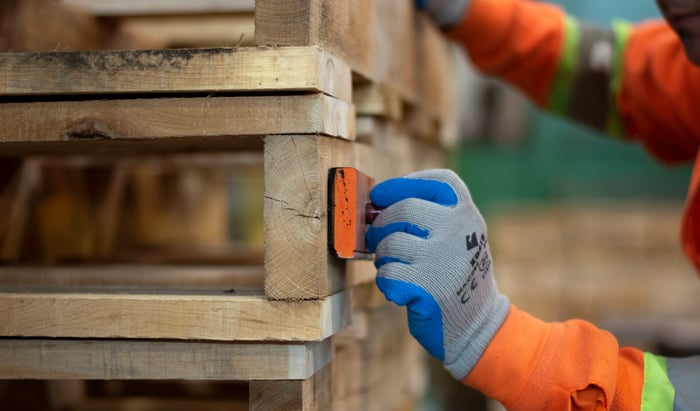
READ THE GUIDE
What to consider before choosing a pallet supplier
Learn all you need to know.
What to consider before choosing a pallet supplier
To the uninitiated, pallets almost seem like a commodity: A pallet is a pallet. But professionals working in logistics or store operations know that couldn’t be further from the truth. Pallets have a big job: They protect your products or raw materials during shipping, they can hold your shipments up at a national border if they don’t have the right certification labels, and they can either accelerate efficiency throughout your distribution system – or bring it to a grinding halt.
When you look at it that way, choosing a pallet provider is a big deal, and the process deserves every bit as much due diligence as more visible purchases (like the products on your store’s shelves).
A pallet isn’t just a pallet anymore
As international trade has evolved and diversified, so has the pallet industry. Pallets used in international shipping have to meet ISPM 15 guidelines, which require them to be treated to keep invasive species of plants and insects from hitching a ride to another country. Some businesses need pallets that work with automated processes in their warehouses. And some businesses need the standard wooden pallets that have served the industry for years.
That’s why you don’t want a vendor who sells pallets; you want a partner who will provide you with an entire pallet solution, someone who knows the pallet industry inside out, and who also understands your business.
You want somebody who knows, for example, that if you’re shipping clothing, weight isn’t a factor – but protecting your products from rips and snags is a top priority. If you’re shipping heavy auto parts, you want somebody who knows that, while weight is a major factor, parts coming from overseas also need to be protected from the corrosive effects of salt water. And if you’re shipping chemicals, you want a partner who can guide you through all the regulatory and safety steps you need to consider.
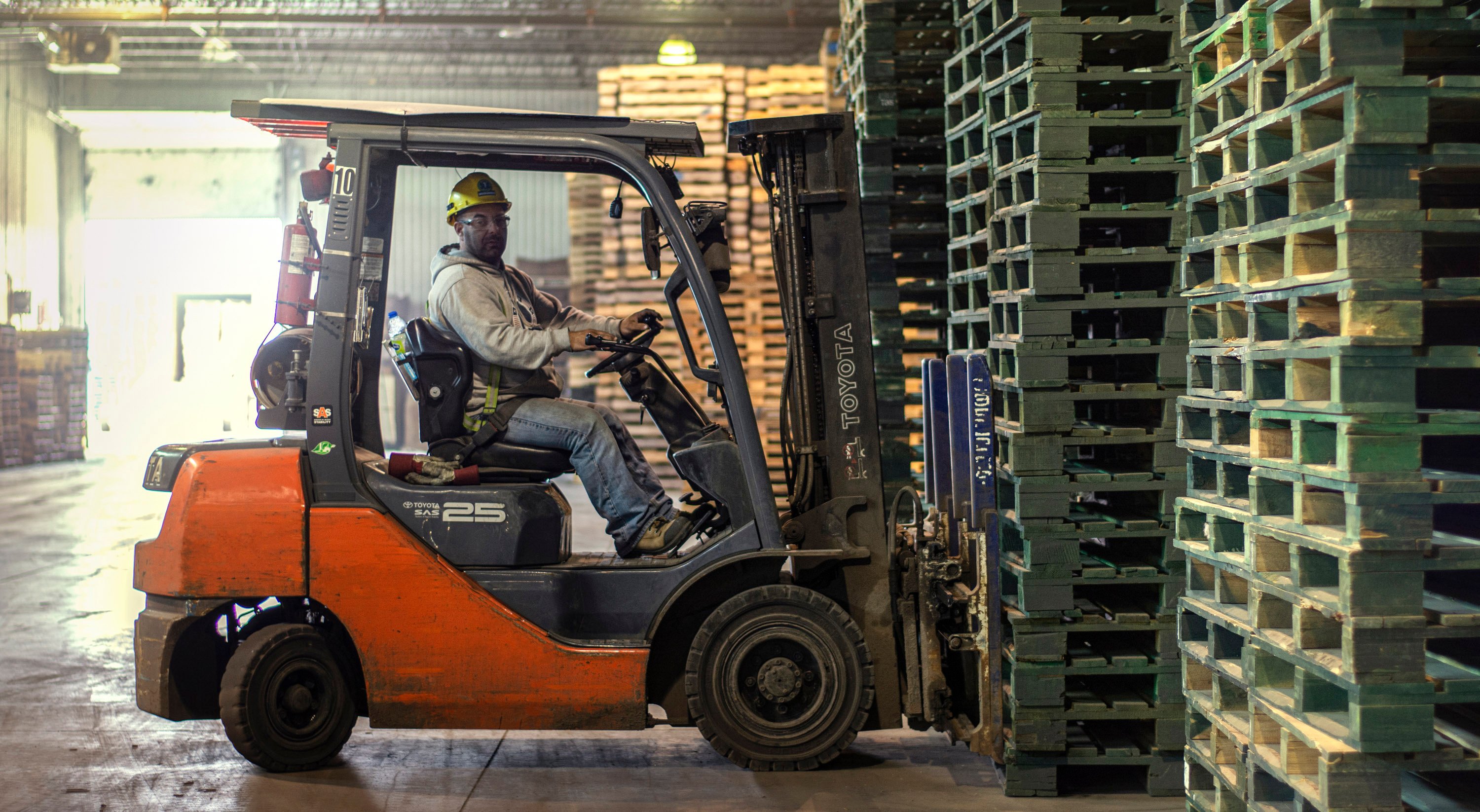
How to choose a pallet vendor who provides a true solution
If that makes choosing a pallet supplier sound like finding a specific needle in the proverbial haystack, don’t worry. It’s a simple matter of knowing the right questions to ask – and the right answers to listen for. Let these questions guide you in your search for a pallet provider.
What’s going on in the pallet industry today?
You want to work with a pallet vendor who’s in tune with the industry. Someone who stays up on the latest developments instead of someone who’s still doing things the same way they’ve always been done. You want a real expert who can look into the future and know what’s coming – things like regulatory changes or a lack of raw materials due to conditions in the area where they’re sourced. That way, you can be prepared instead of having your business disrupted by unpleasant surprises.
What kind of pallets do you work with?
You want a pallet provider who has experience working with many different types of pallets: hardwood, softwood, new, recycled, heat-treated, and custom.
Why is that so important? Because the right supplier should be able to offer advice and guidance. You want somebody who’s already experienced with the type of pallet you need instead of someone who has to start from scratch. They may even know of a better solution than the one you’re using. If so, they should be able to explain exactly why it would work better for your business. If they can’t, that should be a red flag – they might just be trying to push a product with a higher profit margin.
How do you grade your pallets?
There’s no standard for grading recycled pallets, which means that one company’s “Premium A” recycled pallet may be very different from another’s. You need to know each vendor’s specs so that you can make sure you’re comparing apples to apples. Ideally, these specs should be published, and the vendor should have robust quality assurance and testing programs in place to make sure specs are met. If a vendor is unwilling to provide this information, consider that to be a huge red flag.
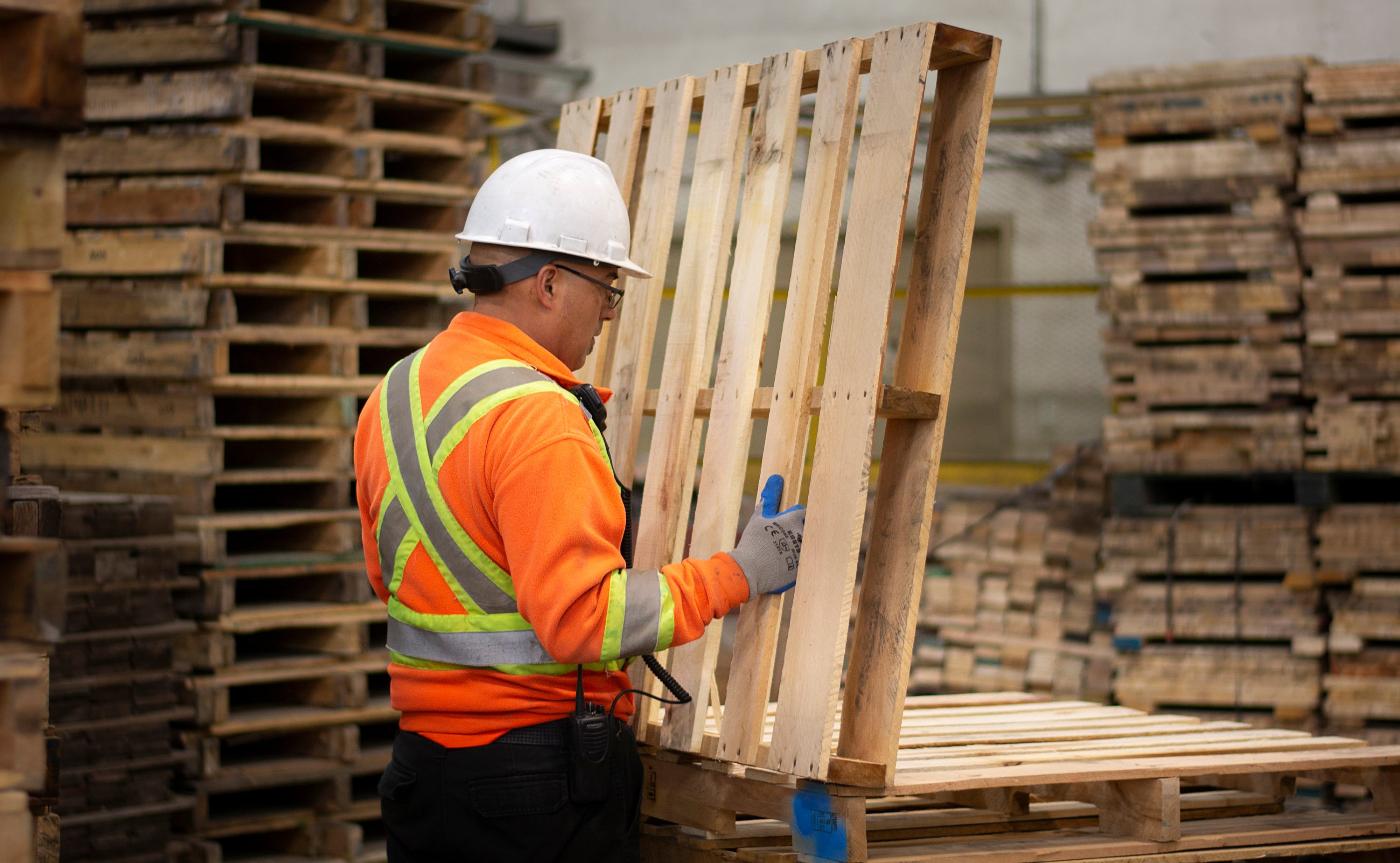
Will you be able to meet our needs?
This is an extremely important question. It’s not uncommon to fall in love with a vendor, only to realize that, for one reason or another, they’re just not ready for such a big increase in volume.
Some big businesses will nurture promising suppliers with an infusion of cash, helping them scale up to meet their needs. However, if you’re not in a position to invest that kind of capital, you have to make your decision based on today’s reality. And sometimes that means recognizing that the supplier you’re considering just can’t scale up in time. (Keep in mind that meeting your first order isn’t enough; you need someone who can manage the entire ecosystem over time, delivering and picking up pallets as your needs require.)
Do you have a stable supply of pallets?
You don't want your pallet supplier scrambling every time you place an order – or, even worse, telling you they're out of stock! A good pallet provider should be able to not only tell you they have stable suppliers; they should be able to describe in detail how their supply chain works and what their emergency back-up plans are.
What are your on-time delivery rates and fill rates?
These are important indicators of how well a pallet provider will be able to meet your needs. The on-time delivery rate is exactly what it sounds like: how often the delivery truck shows up when it's supposed to. The fill rate represents the percentage of the order that's delivered. In other words, if you ordered 100 pallets, did you get 100 pallets? Or did you get 75? Problems with either measurement could lead to problems in your business.
Do you have your own network of facilities and fleet?
Some pallet providers deliver “nationwide” service by outsourcing to third-party vendors, who may or may not follow the same quality standards or safety practices that you expect. You can avoid a lot of headaches by working with a provider who has their own network of brick-and-mortar facilities.
Can we visit your facilities?
Site visits are an important step in vetting potential vendors. Vendors know that and will often offer bells-and-whistles tours as part of the sales process. But to get the real picture, you'll need to make a drop-in visit or two. And be wary of anyone who gets antsy when you show up unexpectedly.
Do you have your own fleet of trucks?
Ideally, you want a vendor that has their own fleet of trucks. If they outsource their fleet to a third-party, make sure the contract allows them to flex up to accommodate your business. In addition, you'll want to check on the third-party's insurance and OSHA compliance, as well as that they meet any other transportation standards specific to your business.
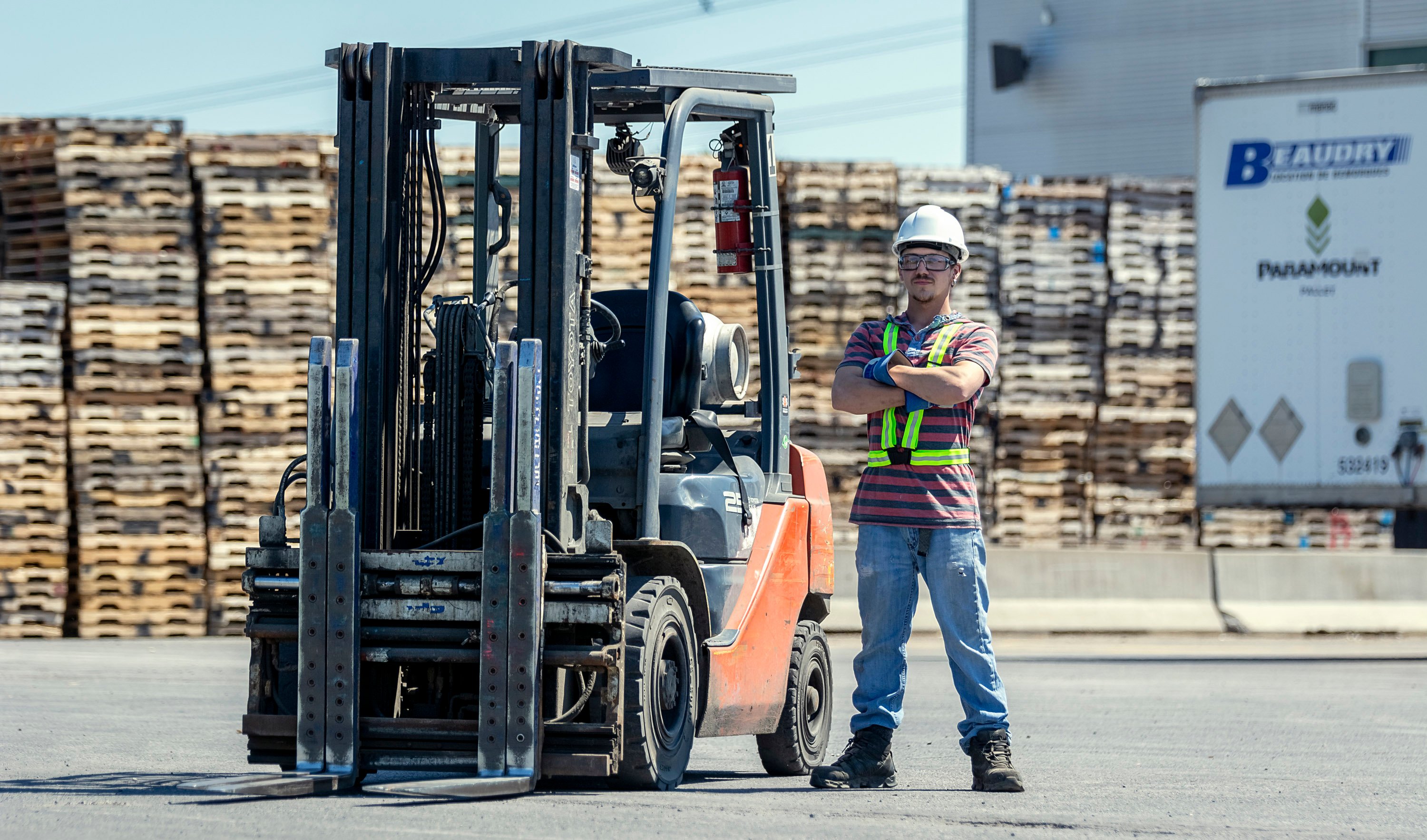
Do you have a business continuity plan in place?
Sometimes things don’t go as planned. Maybe there’s a natural disaster. Maybe there’s a labor strike. Maybe there’s civil unrest in the country where the vendor sources their wood. You want a pallet provider who has thought through these scenarios and has a plan in place. You can find out by asking questions like:
- Do you have the ability to move production to another facility (preferably one far enough away not to be affected by a widespread disaster like an avalanche, flood, or tornado)?
- Do you have a plan for re-routing deliveries if your typical routes are unusable?
- Is your data backed up? Do you have a plan for delivering the same quality customer service if your headquarters location is unusable?
Think carefully before hiring a vendor who can’t readily describe their backup plan. If they haven’t put safeguards in place to protect their own business viability, you can’t expect them to do any better with yours.
How long have you been in business?
While many new businesses end up succeeding, going with a company that's been in business for long time gives you an added layer of security and assurance that they're financially stable.
Another good way to learn about a company's reliability is to ask about their customers. If they have customers that have worked with them for years, that says a lot. There are simply too many options for customers to tolerate a supplier who can't deliver.
Other questions that can give you insight into a vendor’s financial stability include:
- Do you have a reasonable amount of insurance?
- Who is your bank, and how long has your account been open?
- Do you have a revolving line of credit (that confirms that their bank considers them to be creditworthy)?
- What is their current business volume, and how much would your business increase it?
It's possible a vendor might not be able to share some competitive financial information, but you should be able to get a good idea that they are stable and will be able to service your business.
Can you work with me when I have a problem (or opportunity)?
Customer service is critical to business agility. How quickly can the vendor respond to the unexpected, like a spike in demand when a little-known product goes viral and takes the world by storm? Not only do you want a pallet supplier who can scale up when you need to, you want to be able to reach a real person who can provide personalized support instead of leaving a message at the bottom of a multi-layer phone tree.
This is an area where industry experience can make a difference, too. A supplier with experience in your particular industry will be better able to understand the nuances involved in your problem and will, therefore, be able to get you help more quickly.
How will you bill us?
Will you receive a separate bill from each location that provides you with pallets, or can the vendor provide you a simple, single invoice? Can they customize their invoices to break out the data points that are important to you? Can their invoicing system integrate with your payment system? And what are their payment terms? 30 days? 90 days? The easier it is to work with a vendor, the greater their overall value.
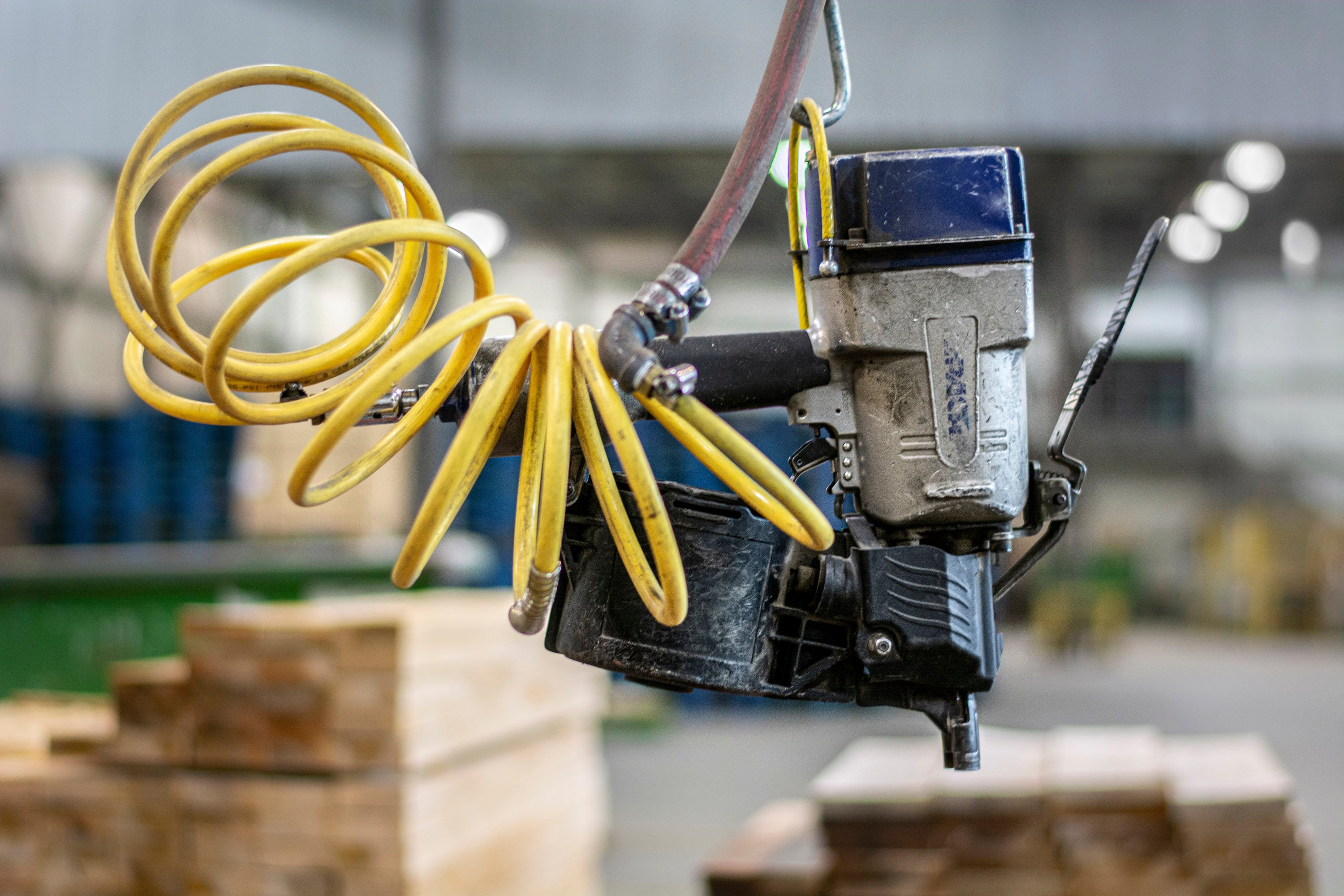
Are you compliant with data security standards?
Data breaches make headlines so frequently these days that it’s easy to shrug your shoulders and conclude there’s nothing you can do. That, however, is a risky mistake: 60% of small businesses that are hacked shut their doors within six months. Between fines, penalties, the inability to do business during an attack, and lost sales afterward, their financial reserves are tapped out.
That's why it's so important to ask a prospective pallet supplier about their data security. You want to know that they’re compliant with all data security regulations, that they actively monitor their systems for unusual activity, and that they have a plan for stopping an attack in its tracks as well as for what to do afterward. (At the least, that post-data breach plan should include notifying authorities and customers, patching any vulnerabilities, and a timetable for how often they will update all impacted.)
What's your company culture like?
You're not looking for one-liners about having a fun work environment or how many employees participate in the company bowling team. You want to hear about employees who have been there for years – and maybe their parents worked there, too! You want to hear stories about how they've accomplished miracles for customers in crisis.
The bottom line? You want to know who you're working with, and you don't find that out through soundbites. You find that out through passionate stories about what the company you are vetting has done for their customers.
And then there’s pricing…
While you may be tempted to go with the cheapest quote, it’s really not that simple. You want to make a decision based on value, not price alone. There’s a lot of value in a partner who provides advice and guidance rather than a vendor who just dumps pallets on your loading dock.
Factors to consider include:
- Can you get a line-by-line quote? The things that are included in a quote can vary widely between vendors. It could be that the vendor who appears to be the cheapest is actually the most expensive if they charge you for “add-on services” that are included in other vendors’ basic price quotes. You would expect, for example, a vendor to charge extra for designing custom pallets for you, but you probably wouldn’t expect an extra delivery fee for the life of the contract.
- What does the supplier provide in terms of labor? Will their staff unload the pallets when they arrive at your warehouse? Will they sort them, handle your freight, perform janitorial services, take broken pallets back to be repaired, and pick up your unused pallets for recycling? The more of these services your pallet supplier provides, the more you save on payroll hours, and the more your employees can focus on tasks associated with your core business.
- Does the contract include a price reduction or refund if they can’t fulfill their commitment? Or are you stuck paying for pallets you didn’t receive, and missed deliveries that resulted in lost sales?
- Does the quote specify how many pallets the vendor will buy back? Some vendors overpromise during verbal negotiations but never actually follow through.
- Does the quote include charges for things you don't need? For example, does the vendor’s quote give you the price for pallets that have been treated to meet ISPM 15 guidelines, even if you’re only shipping domestically?
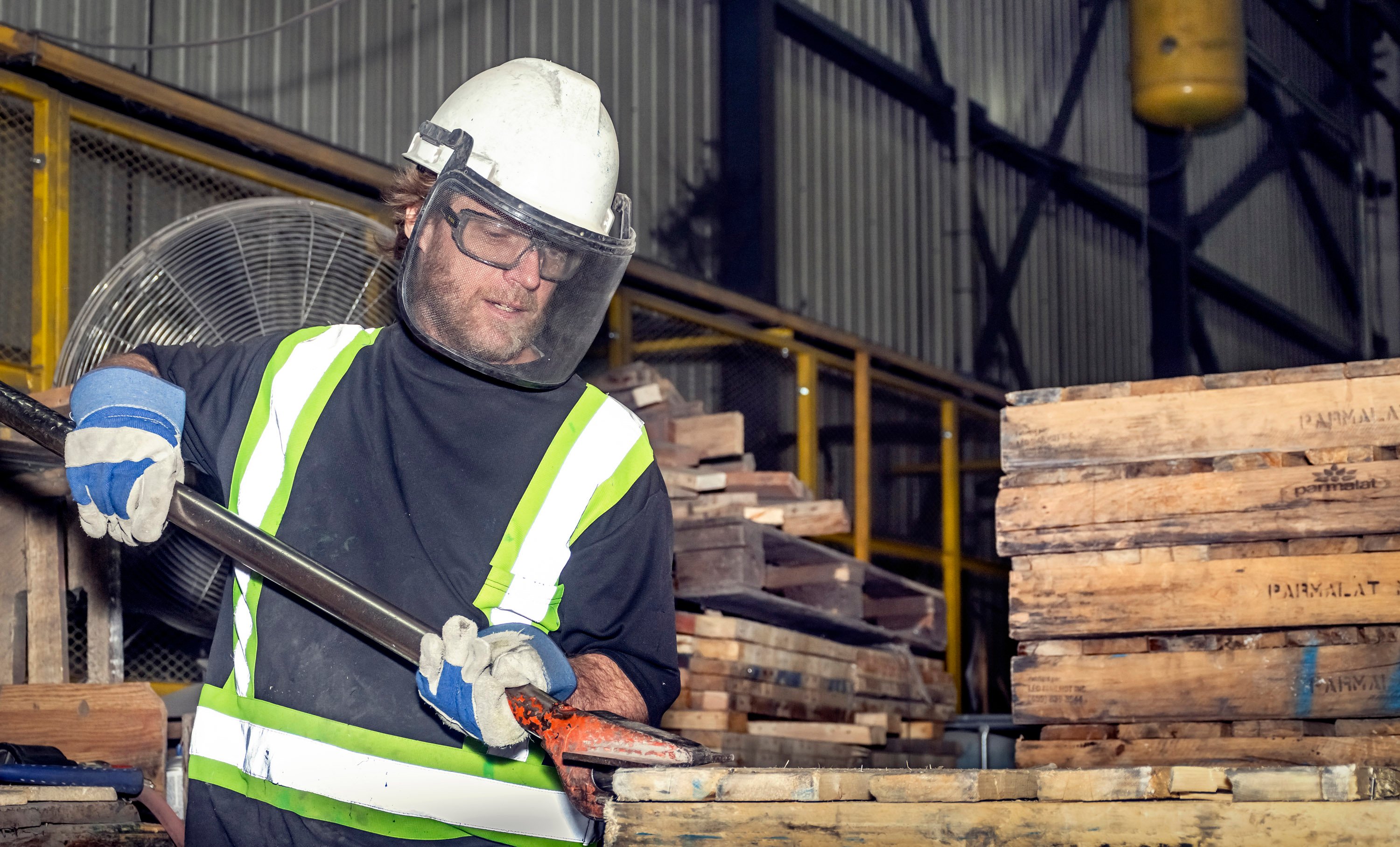
Choosing a pallet provider requires due diligence on your part.
Choosing a pallet provider is not a decision to be made lightly. Just because pallets operate behind the scenes, that doesn’t mean they don’t have a huge impact on your business. Ideally, you want a pallet provider who can give you a complete solution.
In a perfect world, the vendor you choose would meet all of these criteria:
- They’re experts in the pallet industry. They know what’s going on both right now and down the road.
- They understand that different businesses need different pallets – heavy loads need sturdy pallets, fragile loads need extra protection, and so forth – and can guide you in making those decisions.
- They’re able to meet your needs.
- They have their own brick-and-mortar facilities and fleet of trucks.
- They’re financially stable.
- They have exceptional customer service.
- They offer transparent pricing and are willing to work with you on how you want to be billed.
All in all, you want to know who you're dealing with. Ask these questions when evaluating potential pallet suppliers to help you make that decision.
Still need some help? That’s what we’re here for. Get in touch to find out how we can provide the total pallet solution your business needs.

